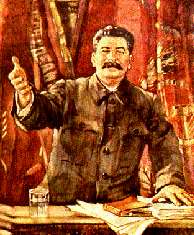
The Cincinnati Review's summer issue has just been released, and my short story Kamkov the Astronomer can be found in its pages. Several readers of this blog may be interested in reading the story, as it's set against the backdrop of The Great Terror of the late-thirties and offers a fictionalized account of one man's involvement in the purge of Leningrad's Pulkovo Observatory (English and Russian website).
The story begins:
One night at his dacha in the country, Stalin looked up from his meal of bread, sausage, and smoked carp to consider a matter of celestial importance. With him in the study were Comrades Kaganovich and Molotov, who stood at the far window, arguing about a constellation. The one said it was Cassiopeia, the other Orion. Stalin wiped the crumbs from his mustache, eager for the debate. Such matters had fascinated him since his youth in the seminary, when he’d often tilted back on his heels to puzzle over the stars. He never had been able to make sense of the heavens. Where others saw bears and scorpions and chained ladies, he saw only a messy splatter of light.
Molotov returned to the low table around which they had gathered, while Kaganovich circled the room, defending his position at great length and with great volume. He provided Molotov with Cassiopeia’s mythological origins and drew meaning between each of sky’s bright dots. He gestured. He laughed at perceived errors in logic. He even touched on phrenology, a philosophy he refused to endorse in the end but one he still found worthy of mention, considering Molotov’s limited grasp of the sciences and the flat spot on the back of his head. Stalin was impressed. He grunted and gave short nods of approval. But Molotov could not be so easily swayed, just as he could not be bothered to fortify his defense. “It is Orion,” he said, simply and completely, before smiling as if only a fool would believe otherwise.
Kaganovich could not tolerate such impudence. He spun and lunged at Molotov’s throat, causing Stalin to shake with laughter and Molotov to rise fighting to his feet. The two men scuffled. The one pushed at the other, and the other pushed back, and then the legs of the two were knocking into the table, shaking the many pieces of china and silver set there. Among the items displaced was Stalin’s tea cup. It jumped, sending its contents across a pile of papers. This ended the argument. It turned Stalin’s laughter into a bark and caused Kaganovich to release the foreign minister’s throat.
Stalin snatched his papers from the table. The top one had received a messy brown splatter, but the names were still legible, the list still intact. He frowned, grimly satisfied by this, and then pressed the top sheet into the chest of his high-collared green tunic, absorbing what had been spilled. “The matter can be very easily settled,” he said. “We will call the astronomers. The astronomers will decide this.”
You can purchase a copy of the magazine at the Cincinnati Review's website. I don't know what they charge to ship a copy overseas, but they've been kind enough to send the last two issues to me here in Kharkov.
If you find you want to read more about the Great Terror after getting my story, you should pick up a copy of Stalin by Edvard Radzinsky. It's where I got the inspiration for my story -- and it's the liveliest read on the subject that I've found.



1 Comment:
Post a Comment